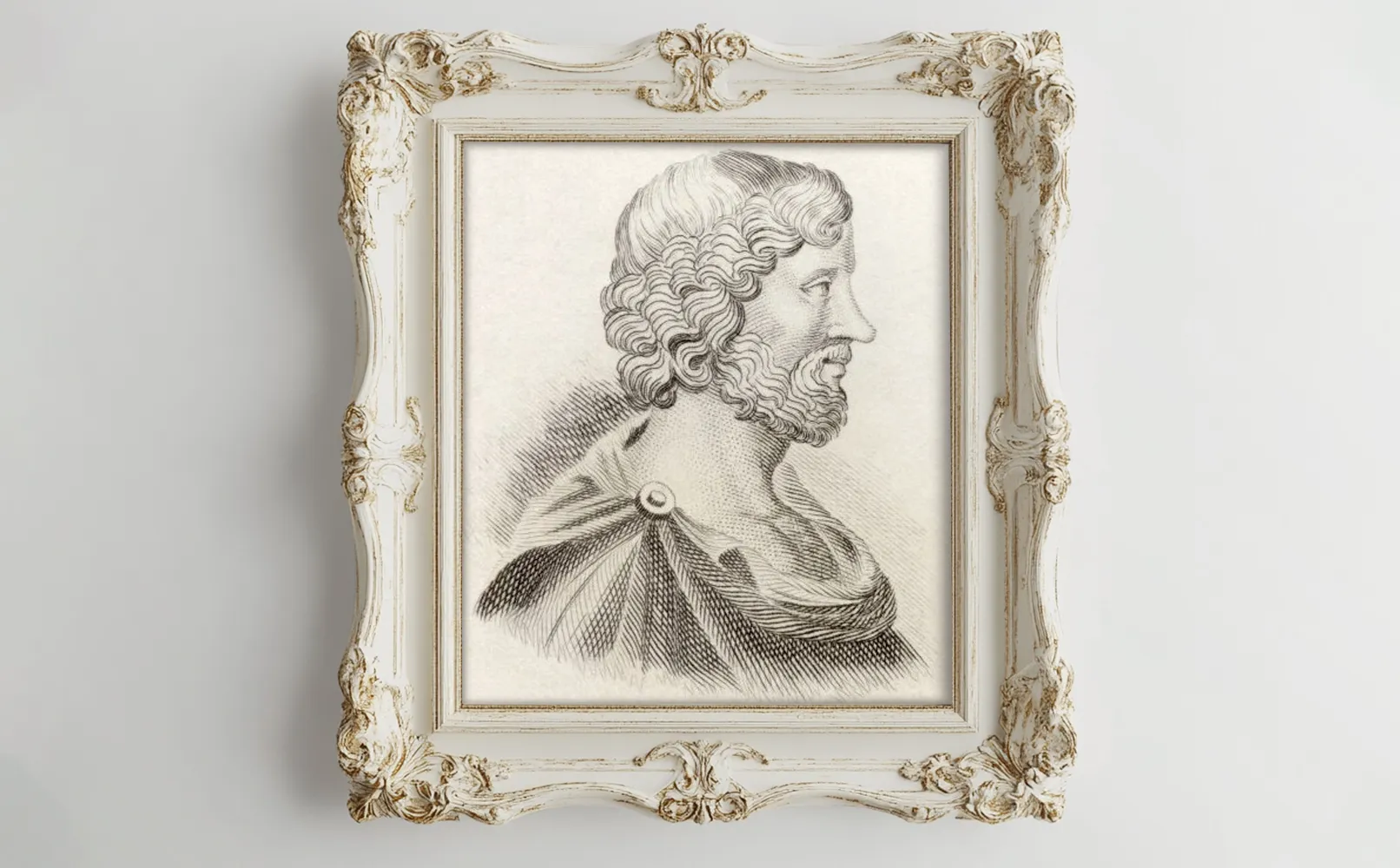Hedonism: How to find your balance in life to live with joy
The term Hedonism dates back to ancient times. In the fifth century BC, a boy was born in Libya who was destined to become one of the most unusual philosophers of antiquity. His name was Aristippus. The life path of this man differed from that of other thinkers of his time. While his contemporaries like Socrates pondered on virtue, knowledge, and justice, Aristippus developed a concept that was both bold and simple: The meaning of life lies in striving for pleasure.

Aristippus believed that true happiness is not to be found in abstract concepts or high ideals, but in the immediate experience of pleasure. For him, pleasure was not something superficial or accidental; it was the essence of human nature, its ultimate goal. He argued that every person should strive for enjoyment – whether through good food, acts of love, dancing, or simply by immersing oneself in a warm bath and reflecting on the world. These seemingly simple pleasures formed the basis of his philosophy, which later became known as Hedonism.
Although Aristippus' philosophical ideas did not achieve the same fame as the teachings of his contemporaries, his theory of life as the pursuit of pleasure left a deep impression in the history of thought. The Hedonism that emerged from his ideas remains relevant today, offering people a different perspective on happiness and the meaning of existence.
Table of Contents
What is Hedonism?
Hedonism is a philosophical direction that claims pleasure and enjoyment are the highest goods and main goals of human life. The term comes from the ancient Greek word "hedone," meaning "pleasure" or "enjoyment." According to hedonistic belief, all human actions are motivated by the pursuit of pleasure and the avoidance of pain or suffering.
The idea of Hedonism is that the search for pleasure is a natural and fundamental aspect of human existence. Pleasure is understood not only as physical but also as emotional and intellectual well-being. Hedonists believe that the moral value of actions is determined by the extent to which they increase the overall level of pleasure and decrease suffering.
Hedonism is also commonly misunderstood and solely associated with excess and amorality. However, many hedonistic theories emphasize the need for a rational approach in seeking pleasures, taking into account the consequences of one's actions for both oneself and others. Hedonism suggests considering pleasure as a criterion for evaluating life decisions and striving for a balanced and harmonious life.
Over time, Hedonism has taken on various forms and interpretations. Some philosophers emphasized the importance of immediate and momentary pleasures, while others focused on long-term happiness and mental peace. Despite different approaches, the central idea of Hedonism remains unchanged: the pursuit of pleasure is a fundamental aspect of human nature and life's goal.
Key Ideas of Hedonism
Hedonism is a philosophy that asserts pleasure and enjoyment are the highest goods and main goals of human life. At the core of Hedonism is the idea that the pursuit of happiness and the avoidance of suffering is a natural and proper endeavor for every individual. Hedonists believe that the moral value of actions is determined by how they increase pleasure and decrease pain.
The key ideas of Hedonism are diverse and encompass various types of pleasure — from physical enjoyment, such as eating or rest, to intellectual and emotional well-being, such as social enjoyment or a sense of fulfillment. It is not only the pleasure itself that matters, but also its quality, duration, and impact on overall satisfaction with life.
Epictetus, one of the most important philosophers who further developed Hedonism, made significant additions to this theory. He argued that true happiness lies not only in physical pleasures but also in peace of mind, which he referred to as ataraxia. Epictetus believed that to achieve this state, it is necessary to rid oneself of the fear of death and gods and to avoid excessive pleasures that could lead to suffering. He suggested distinguishing between natural and necessary pleasures, such as eating and sleeping, and unnecessary ones, such as the pursuit of luxury or fame.
In the Renaissance and the Enlightenment, philosophers Michel de Montaigne and Jeremy Bentham also contributed to the further development of hedonism. Montaigne emphasized in his essays the importance of enjoying moments of life and true human pleasures. Jeremy Bentham further developed the ideas of hedonism and created the Theory of Utilitarianism, which posits that the morality of actions is determined by their ability to bring the greatest happiness to the greatest number of people. His approach expanded hedonism to a social level where happiness is not only a personal goal but also a societal good.
Although various philosophers interpreted and developed hedonism differently, the central idea remains unchanged: The pursuit of pleasure and happiness is a fundamental goal that every person should strive for in their life.
Common Questions about Hedonism
When someone first encounters the concept of hedonism, certain questions may come to mind. For example: "Is overeating before going to sleep, drug consumption, or promiscuous sex also considered hedonism? After all, these activities bring pleasure to some people as well." This question is quite logical, as hedonism claims that the pursuit of pleasure is a natural and right life goal.
Hedonism does indeed advocate the pursuit of pleasure, but not in every form and without considering the consequences. True hedonism takes into account long-term well-being and the avoidance of harm, both for oneself and others. For instance, overeating before sleep may bring immediate joy, but it can lead to health issues and a decrease in overall happiness levels in the long run. Similarly, drugs can trigger temporary euphoria, but their consumption is often associated with severe consequences like addiction and the deterioration of life.
Hedonism advocates a rational and responsible approach to pleasures. This means striving for forms of enjoyment that bring sustainable and healthy happiness, without destroying one's own life or harming others. Genuine hedonism is not the pursuit of every pleasure, but the ability to choose those joys that promote long-term well-being.

Hedonism in Philosophy
Hedonism as a philosophical doctrine has its origins in antiquity and is associated with the name Aristippus of Cyrene. Aristippus, a student of Socrates, believed that the highest good of humanity lies in the pursuit of pleasure and that this pursuit should guide all human actions. For Aristippus, pleasure was not limited to physical pleasures; he also encompassed mental and emotional satisfaction. According to his teachings, every person should strive for pleasure here and now and not postpone it to the future.
Epicurus, another influential philosopher, further developed the ideas of hedonism by introducing the concept of Ataraxia - inner peace and imperturbability. Epicurus claimed that true pleasure lies not only in physical pleasures but also in mental peace, freedom from pain and fear. He recommended avoiding excessive pleasures that could lead to suffering and pursuing pleasures that bring long-term happiness and cause no harm.
In the Middle Ages, hedonism was largely supplanted by Christian morality, which emphasized renunciation of worldly pleasures in favor of spiritual salvation. However, in the Renaissance and the Enlightenment, interest in hedonism was revived. Michel de Montaigne emphasized in his essays the importance of enjoying moments of life and personal pleasures, reflecting the spirit of hedonism. Jeremy Bentham further developed the ideas of Utilitarianism and proposed judging the morality of actions based on their ability to bring the greatest happiness to the greatest number of people, which can be considered a social form of hedonism.
Modern philosophers also turn to hedonism and adapt it to new conditions. For example, the French philosopher Michel Onfray further develops the ideas of a secular hedonism and argues that humans should strive for pleasures that bring joy and satisfaction without causing harm to themselves or others. He suggests rethinking hedonism as an ethical system that helps individuals lead a fulfilled and happy life in modern society.
Thus, hedonism has come a long way from antiquity to modern times and has adapted to various cultural and historical contexts. Despite the changes and developments, the central idea of hedonism - the pursuit of pleasure and happiness - remains unchanged.
Pleasure is the only thing we should live for. Nothing ages us as much as happiness.
Oscar Wilde
Irish writerHedonism in the Present
Hedonism remains a relevant philosophical concept in the modern world, although its interpretation and application have undergone significant changes. Today, hedonism is not limited solely to the pursuit of physical pleasures, but encompasses a wider spectrum of life aspects, such as personal development, emotional well-being, and social responsibility.
Michel Onfray's Concept
The French philosopher Michel Onfray is one of the most renowned contemporary thinkers who has further developed the ideas of hedonism. He has proposed a concept he calls "Ethics of Pleasure." In his theory, Onfray asserts that every person has a right to happiness and enjoyment, but this right comes with certain responsibilities towards oneself and society.
Central to Onfray's Ethics of Pleasure is the idea of harmony – both internally and externally. He believes that pleasure should not only bring joy to oneself but also should not harm others. This means that individuals should consciously manage their pleasures and strive for forms of enjoyment that promote their physical and emotional well-being without destroying their own lives or the lives of others.
Onfray critiques the modern consumer society, where pleasure is often reduced to material goods and superficial joys. Instead, he suggests seeking deeper and more sustainable sources of happiness, such as art, culture, intellectual development, and social connections. In his philosophy, Onfray calls for a personal and social revolution where people learn to appreciate true joys and shape their lives based on harmony with the world and themselves.
This concept represents an evolution of hedonism, where pleasure is not seen as an end in itself but as a means to achieve a fulfilling and happy life. Onfray believes that only through a conscious and responsible approach to one's pleasures can true happiness and inner peace be achieved.

Hedonism and Work
Work takes up a significant part of our lives, so it is important to find ways to integrate the ideas of hedonism into this area to be successful and find joy in work. Hedonism, which emphasizes the pursuit of pleasure and happiness, can prove to be a useful philosophy in making work a source of joy and satisfaction.
Firstly, hedonism encourages us to seek work that matches our interests and passions. When someone does what they truly enjoy and find great meaning in, they experience joy in the work process, which enhances motivation and productivity. Work is no longer perceived as a burdensome duty but becomes a significant part of life that brings joy and satisfaction.
Secondly, hedonism reminds us of the importance of balancing work and personal life. Excessive involvement in work without considering one's own needs and desires can lead to burnout and a decrease in overall happiness. It is crucial to find time for relaxation, hobbies, and spending time with loved ones to maintain emotional and physical well-being. Maintaining a balance between work and leisure helps preserve health, motivation, and joy in life overall.
Hedonism also teaches us to appreciate the small pleasures in the work process. These can be positive emotions when achieving goals, the sense of fulfillment after completing a task, or even pleasant moments in conversation with colleagues. These seemingly insignificant details help maintain a positive attitude and find joy in work every day.
Hedonism emphasizes the importance of a pleasant work environment. The environment in which we work can significantly influence our emotional well-being and satisfaction. When the workspace is comfortable and aesthetically pleasing and there is a positive atmosphere within the team, this promotes more productive and joyful work.
Hedonism challenges us to approach career choices consciously, pay attention to the balance between work and personal life, find meaning in work content and joy in the work process, and strive to create a pleasant work environment. Integrating these principles into everyday life can turn work into a source of joy and happiness and ultimately lead to a more harmonious and fulfilling life.
Hedonism and Freud's Theory
It seems to me that hedonism and the theory of Sigmund Freud have much in common, as both approaches consider the role of pleasure and the pursuit thereof as central elements of human behavior and psychology.
Freud, one of the founders of psychoanalysis, developed a theory in which the pleasure principle plays a central role. According to this principle, human behavior is motivated by the pursuit of avoiding pain and experiencing pleasure. Freud claimed that our unconscious impulses, especially those related to sexuality and aggression, aim to achieve pleasure and reduce internal tensions.
This principle bears a direct similarity to hedonistic philosophy, which also considers pleasure as the primary goal of human life. In Freud's theory, our inner self is an arena of conflict between various forces, where the pursuit of pleasure (Id) often conflicts with moral and social norms (Superego). This conflict generates tensions that the individual strives to resolve by finding a balance between their desires and reality (Ego).
Unlike hedonism, which openly acknowledges pleasure as a positive value, Freud emphasized the complexity and ambivalence of this pursuit. He pointed out that fulfilling all desires does not always lead to happiness and that the repression or transformation of certain impulses may be necessary for mental health. This aspect of Freud's theory indicates that simply following the pleasure principle can lead to internal conflicts and neuroses if the complex interactions between the different levels of the psyche are not considered.
Freud also introduced the concept of sublimation - a process where basic instincts and desires, especially sexual ones, are transformed into socially acceptable behaviors and creative activities. Sublimation allows individuals to satisfy their desires in a way that brings long-term satisfaction and serves societal well-being, aligning with the ideas of hedonism where a rational and responsible approach to pleasure is important.
"I can resist everything except temptation."
Oscar Wilde
Irish WriterDangers of Excessive Hedonism
One of the greatest dangers of excessive hedonism is becoming addicted to quick and easy pleasures. When an individual constantly seeks instant gratification of their desires, they may lose the ability to find joy in deeper and more meaningful aspects of life. For example, excessive consumption of food, alcohol, or entertainment can lead to a deterioration of physical and mental health, ultimately reducing overall levels of happiness.
Another danger is the tendency toward dependency. When pleasure becomes the sole goal, individuals may start seeking increasingly stronger and extreme ways to achieve it, often leading to destructive dependencies like alcoholism, drug addiction, or gambling addiction. These dependencies not only harm the individual but can also destroy their relationships with others, their career, and even their life.
Excessive hedonism can also lead to moral decay and a loss of responsibility. When the pursuit of pleasure becomes the only measure, individuals may begin to disregard moral and ethical norms, ultimately leading to selfish and antisocial behavior. In such a case, hedonism loses its positive value and becomes a destructive force, both for the individual and society as a whole.
To avoid these dangers, it is important to maintain a balance and approach pleasures with reason and responsibility. Hedonism can be beneficial when based on conscious choices of pleasures that promote long-term well-being and cause no harm to oneself or others. True hedonism is the art of enjoying life in harmony with oneself and the environment, rather than pursuing short-term pleasures at any cost.
Hedonism in the Song "Young, Wild & Free" by Snoop Dogg: An Anthem of Enjoying Life
The song "Young, Wild & Free" by Snoop Dogg, Wiz Khalifa, and Bruno Mars reflects the essence of hedonism - a philosophy that views the pursuit of pleasure and enjoyment of life as the ultimate goal. The song's lyrics celebrate youth, freedom, and the pursuit of joy, emphasizing the idea that life should be lived without unnecessary worries and restrictions. The protagonists of the song live in the moment and ignore social norms, perfectly fitting the hedonistic worldview. This track encourages living in the present, seeking personal pleasure, and enjoying the freedom of self-expression. In the context of hedonism, the song symbolizes the joy of life and the rejection of stress in favor of maximum joy and freedom, making it a modern anthem of this philosophy.
Conclusion
Hedonism is a philosophy that has fascinated many people for centuries by offering a simple and understandable path to happiness through the pursuit of pleasure. This idea, despite its apparent simplicity, encompasses many nuances and requires a conscious approach to life. Hedonism teaches us that pleasure and joy can and should be part of our lives, but only if they contribute to our long-term well-being and harmony with the environment.
From ancient philosophers like Aristippus and Epicurus to modern thinkers like Michel Onfray, hedonism has evolved by adapting to changes in society and culture. Today, it remains relevant and invites people to reconsider their life priorities and pay attention to the importance of personal happiness, health, and emotional well-being.
True hedonism does not demand that all desires be thoughtlessly fulfilled. It calls for responsibility, awareness, and the understanding that true happiness is not achieved through immediate pleasures, but through a balanced, harmonious life. Hedonism is the art of living in a way that joy and pleasure accompany us at every step of our journey through life, enriching rather than destroying our own or others' joy of living.
Thus, hedonism offers us not only the pursuit of pleasure, but also a philosophy that helps us find a balance between joy and responsibility, happiness and duty, enjoyment and common sense. Here lies its strength and significance for anyone seeking a path to a more fulfilling and happier life.
Postscript
For me as an author, the topic of hedonism is very interesting. When one has already passed the halfway point of life, questions about meaning and purpose begin to haunt one daily. I look back and ask myself: Why do I do this, what was the point? Hedonism fascinates me with its straightforwardness: Live for pleasure, but not at the expense of others. This philosophy gives one the right to enjoy life, make loved ones happy, and go to work that one truly loves. Live in a way that brings benefit and joy to you and those around you every day.
There is no room here for self-sacrifice and self-denial. This is about balance — between what you need and what is important for your loved ones. Hedonism teaches us to enjoy life to the fullest, to find joy in the little things and in every moment. It is a path to a life where pleasure and meaning go hand in hand, where you become better and also make the world around you better.
If this topic resonates with you, explore other areas of the website. For example, pages with Dark Humor or Good Morning Greetings — they could add a bit of spice and positive energy to your day.
From Vitalii Shynakov
